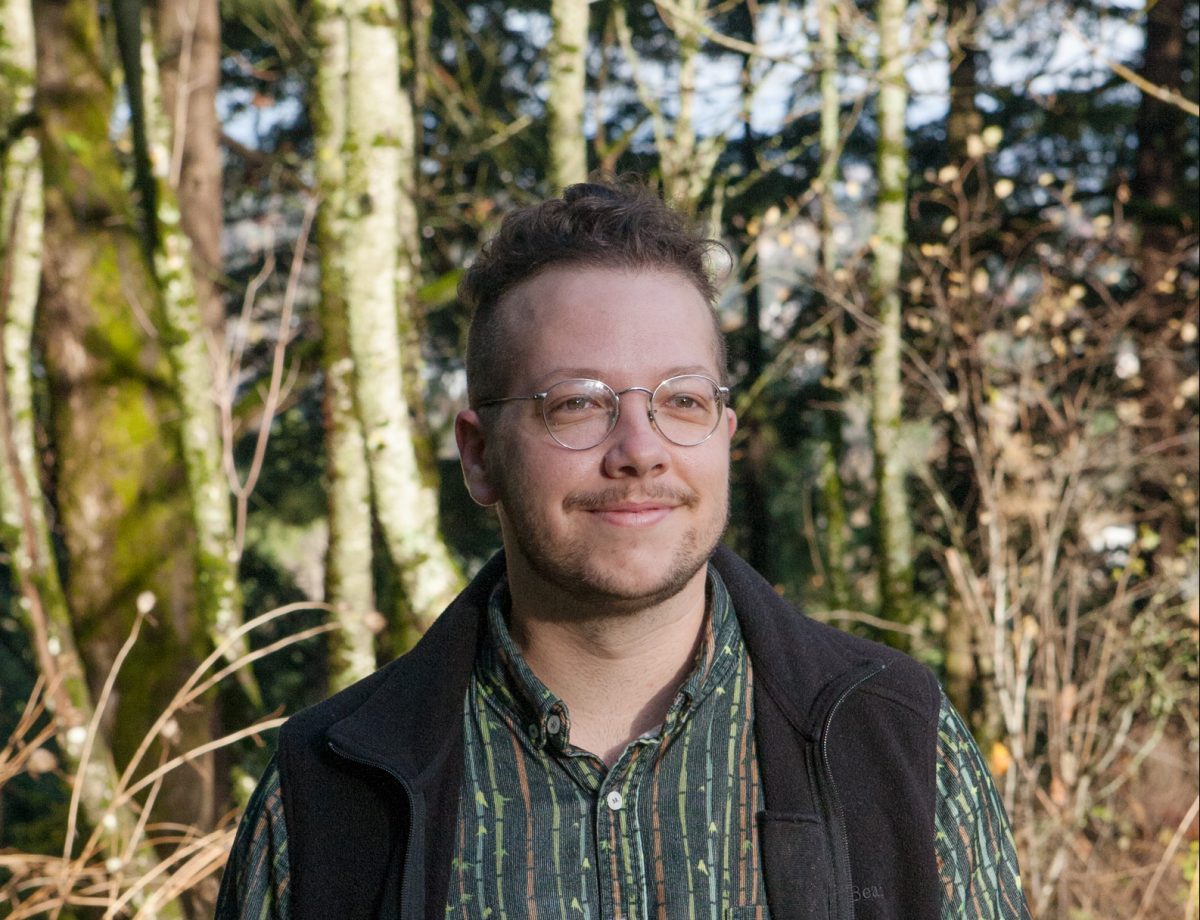Why do creators create? It could be argued that someone’s creative endeavor speaks to who they are as a person, that it’s a way of sharing who they are with the world around them. What matters to them? What do they have to say? Why share at all? After speaking as part of CWU’s Lion’s Rock Visiting Writers series, author Callum Angus sat down with The Observer to discuss the creative process and what it means for him to put pen to paper.
Callum Angus is an author and journal editor hailing from Portland, Oregon. According to Angus, writing is in his blood; with many family members having also been published writers, including his father, grandfather and grandmother. “I really resisted wanting to be a published writer for a while,” Angus said. “I thought, ‘Let’s see what other ways of being in the world there are before I commit to this.’”
While in college, Angus studied several fields and subjects, earning a bachelor’s degree in geography and majoring in science as an undergraduate. However, Angus still found time to study English, magazine and short story writing. “Spending that time invested in a different discipline, I think, really shaped how a lot of my writing has progressed,” Angus said. “From that, I write a lot and think a lot about other organisms, other ways of being, biology and ecology are really important to my process.” After college, Angus spent some time interning at a newspaper, but found that journalism wasn’t for him. Instead, Angus chose to go back to his roots and write in a discipline he felt he could use to express himself—fiction.
Since then, Angus has published a number of pieces, including his short story collection “A Natural History Of Transition.” The collection features a number of tales that “disrupts the notion that trans people can only have one transformation,” according to the description on Angus’ website, and features a surrealist style of storytelling.
Angus, who is transgender himself, expressed dissatisfaction with how queer writers have been treated in the wider literary world. “During my MFA [Master of Fine Arts] experience, we had not been assigned to any trans or queer authors in my creative writing classes,” Angus said, frustrated with the lack of representation.
The natural world is a subject that Angus often writes about as it’s one very important to him, but he feels that it’s a topic not many transgender writers are given the opportunity to speak on. “It felt like the places where environmental writing was happening, or eco writing was happening, they didn’t think that trans writers were, quote-unquote, ‘natural enough to be included,’ and they didn’t really care about our perspectives or struggles,” Angus said. This was Angus’ primary motivation for starting the literary journal “Smoke And Mold” in 2019. The goal of the journal is to help bridge that gap and show that transgender people have a lot to contribute to the subject of nature writing, climate change and the natural world. “I mean, trans people are changing their bodies, they’re changing names, they’re thinking about their relationships to their families, and communities,” Angus said, “All of this is inherent to what I think nature writing is.”
When asked if he thought publishers had ever passed up his work due to his status as a queer writer or the fact that it’s often a subject matter of his work, Angus said it was hard to know. According to Angus, publishers don’t often state reasons for rejection. Despite this, he’s never felt deterred from publishing his work. “I decided I didn’t want to go chasing down, you know, affirmation or publication from bigger publishers, from agents. I was just going to look for a press that had my values and trans writing at its core,” Angus said.
Angus also provided a window into his creative process and shared some tips for aspiring writers. Angus shared that one of his motivations to write, aside from his relationship with the natural world, is actually failure. “Even a finished short story that I like never really comes out exactly how I imagined it in my head and that failure or that disappointment is a big part of what keeps me writing because I want to try it again,” Angus said. “And I think if I ever stopped feeling that I would probably stop writing, but so far, I haven’t.”
Another part of the writing process for Angus is immersing himself in other disciplines, such as gardening, taking walks in nature and listening to music, which he finds all inspire him artistically. Angus also added some thoughts regarding the rules and structures of writing. “It depends on what you want to write,” Angus said. “But also, I think there’s a lot of different sets of rules and different ways to engage with these modalities.” Angus detailed that he would advise students writers to engage with the rules of their craft in a way that makes them curious and provides them with options to explore. He says that while breaking rules can be great, it also helps to have some constraints to narrow down your vision.
Angus’ most important piece of advice for young writers boils down to hesitation. “Just start, don’t wait for permission,” Angus said. “Don’t wait for the right idea, just start writing every day, work through a body of work.” Angus argued that the more you write, the better you will become at it, as you’ll always be striving to improve upon your previous work. He also adds that you shouldn’t be in a rush to publish your first story anyway. “They’re never as good as you think they are,” Angus said. “But they will be helpful and they will help you figure out who you want to be in conversation with your work.”
Readers can find Angus’ body of work at calangus.com and follow his editorial work at smokeandmold.net.








